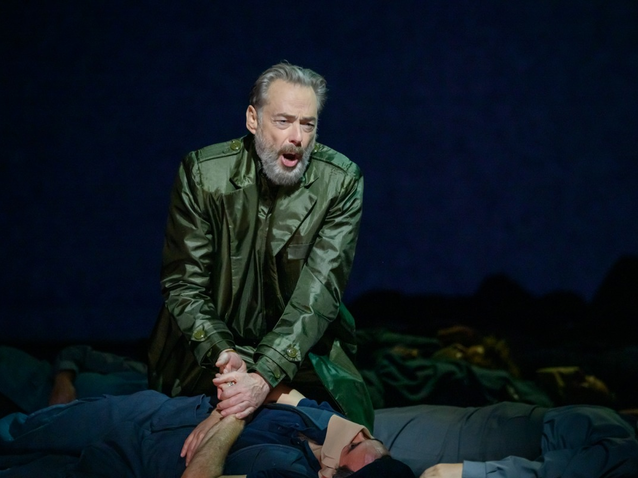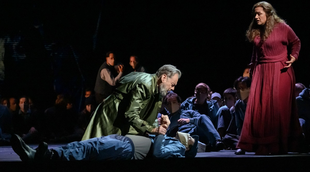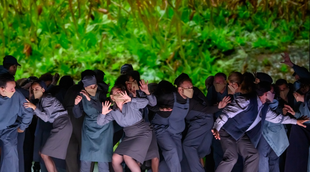 © A. Bofill
© A. Bofill
In 1942 composer Benjamin Britten declared himself a conscientious objector in front of a tribunal. Twenty years later, in 1962, his War Requiem was premiered as part of the commemorations of the inauguration of Coventry cathedral’s reconstruction, which had been destroyed during the German air raids of WWII.
The composer, who considered this piece as one of his most important creations, made a requiem without epic character, without exaltation of the heroes fallen in the honour of battle and lacking any kind of patriotic glorification. In Britten’s requiem there aren’t ‘goodies and baddies’, only compassion for the absurd pain and suffering experienced by human beings as a result of war: the ultimate expression, barbaric and criminal, of the absolute failure of any reasonable idea of humanity.
The piece, of monumental dimensions, uses the Latin text of the Mass for the dead as a base, interspersed with nine touching poems by Wilfred Owen, an English soldier and poet who died at the front a week before the end of WWI. The piece truly requires an army of sound in order to be performed: mixed choir, children’s choir, three soloist singers, and a full and extended orchestra – so much so it overflowed the pit and occupied the first two rows of the stalls.

War Requiem - Gran Teatre del Liceu Barcelona (2021) © A. Bofill

War Requiem - Gran Teatre del Liceu Barcelona (2021) © A. Bofill
For the premiere, Britten wanted to have representation of the confronting powers in the war that had destroyed the cathedral and requested for the tenor to be British (his lifelong companion, Peter Pears), the baritone to be German (the great Dietrich Fischer-Dieskau) and the soprano to be Russian. It was planned for her to be Galina Vishnevskaia, wife of Mstislav Rostropovich, but deep in the Cold War, the Soviet authorities didn’t allow her to travel and she had to be replaced at the last minute by Heather Harper.
Liceu wanted to reproduce Britten’s idea and for this War Requiem called British tenor Mark Padmore, German baritone Matthias Goerne and Russian soprano Tatiana Pavlovskaya. This was a wise choice given that the vocal lines of the Owen poems, which are mainly sung by the tenor and baritone, have a marked Lied character and both Padmore and Goerne come from the world of Lied.
The musical result was exceptional. Josep Pons, who has always felt very comfortable in the complex music of the 20th century, obtained from the orchestra a balanced and delicate sound, almost chamber like when accompanying the soloists. Despite the large orchestration, Britten didn’t aim for his requiem to be about stridency and screaming but about introspection. Pons embedded this idea and didn’t offer grandiosity but intimacy and proximity. The choir, prepared for the first time by its new conductor, Pablo Assante, responded magnificently to a score presenting great demands and which is outside its habitual repertoire. The same can be said for the children’s choir Amics de la Unió.
In the soloists section, Padmore excelled singing with intense expression, Goerne – who will be coming back to Liceu this season for Wozzeck – also offered a high vocal performance, and Tatiana Pavlovskaya, although less brilliantly, didn’t have any problems with the soprano part.
Liceu wanted to present the War Requiem in staged version, a risky option as the piece isn’t an opera, doesn’t present defined characters interacting amongst themselves and doesn’t have a dramatic core or an action that progresses or evolves. Therefore, converting this into a staged performance isn’t easy.
Daniel Kramer succeeded quite well in this challenge and his proposal, which was premiered at the English National Opera in 2018, works well as a staged musical piece. Kramer, who has captured the essence of the score, leaves behind the military paraphernalia and the loud racket and, like the music, searches for introspection and the externally contained expression of the pain that burns inside.
The contribution in the project of German conceptual artist and photographer Wolfgang Tillmans is fundamental in giving visual power to the performance through the video projection over three big screens.
Finally, it is worth highlighting the choreography work of Ann Yee, who achieved to give dramatic meaning to the movement on stage of over a hundred people without turning it into chaos.
The staged version of War Requiem, which will be preformed at Liceu until the beginning of November, is a performance of very high level which honours the theatre.
by Xavier Pujol
Barcelona, 21st October 2021
War Requiem by Benjamin Britten. Tatiana Pavlovskaya, soprano. Mark Padmore, tenor. Matthias Goerne, baritone. Orchestra and Choir by Gran Teatre del Liceu. Children’s choir Amics de la Unió. Josep Pons, conductor. Daniel Kramer, stage director. Wolfgang Tillmans, set design and video artist. Ann Yee, choreography. Nasir Mazhar, costume design. Co-production by English National Opera and National Kaohsiung Center for the Arts (Weiwuying). Gran Teatre del Liceu.
the 24 of October, 2021 | Print

Comments